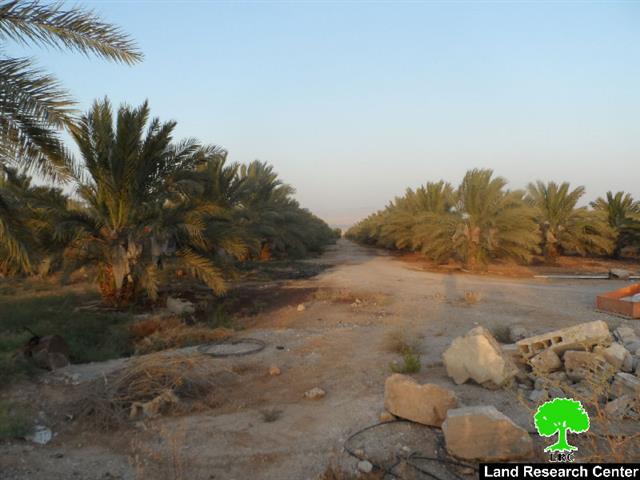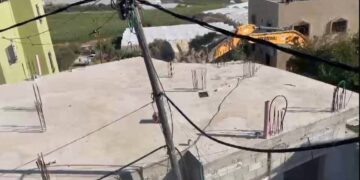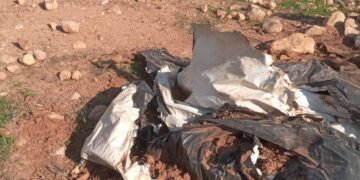Violation: destroying an agricultural room
Location: east Jericho city
Date: August 18, 2015
Perpetrators: the Israeli occupation army
Victims: Citizen Isam Abu Zaineh
Details:
A massive force from the Israeli occupation army accompanied by a military dozer on August 18, 2015 raided the eastern side of Jericho city and embarked on demolishing an agricultural room that is used to store equipments in addition to a water cistern (1.5m3). The demolished structures belong to Citizen Isam Abu Zaineh from Jericho.
Abu Zaineh owns 25 dunums of palm fields that are located nearby the bypass road no.90, east Jericho city. It should be marked that Abu Zaineh set up a 12m2 caravan in his plot to use it as storehouse for agricultural equipments. The land is reported to be Abu Zaineh’s source of income to support his 8 member family.
The Israeli occupation authorities on April 2015 served Abu Zaineh a stop-work and dismantlement order on his caravan under the claim of unlicensed construction but farmer Isam did not care much about it and kept on taking care of his land until the occupation came and demolished the caravan.
Photos 1-3: the demolished agricultural room
Photo 4: the palm groves
Targeting the Palestinian agricultural sector has been always an Israeli policy to strike farmers’ confidence and economy. This comes within the Israeli confiscation campaign, which aims at serving colonial expansion plans.
Jericho underwent numerous attacks on the agricultural sector that were represented in demolishing water pools, barns and farms in addition to evacuating lands under the claim of them being “state lands”.
Land Research Center LRC sees that demolitions contradict with all of the International conventions and Humanitarian laws including:
- Article 17 of the (1948) Universal Declaration of Human Rights stating: “Everyone has the right to own property alone as well as in association with others. No one shall be arbitrarily deprived of his property.”
- Section ‹G› of article 23 of the (1907) The Hague Conventions asserting: “In addition to the prohibitions provided by special Conventions, it is especially forbidden to destroy or seize the enemy's property, unless such destruction or seizure be imperatively demanded by the necessities of war.”
- Article 53 of the Geneva Fourth Convention (1948) declaring: “Any destruction by the Occupying Power of real or personal property belonging individually or collectively to private persons, or to the State, or to other public authorities, or to social or cooperative organizations, is prohibited, except where such destruction is rendered absolutely necessary by military operations.”
- Section 1, Article 11 of the International Covenant on Economic, Social and Cultural Rights (1966): “The States Parties to the present Covenant recognize the right of everyone to an adequate standard of living for himself and his family, including adequate food, clothing and housing, and to the continuous improvement of living conditions. The States Parties will take appropriate steps to ensure the realization of this right, recognizing to this effect the essential importance of international co-operation based on free consent."
Prepared by
The Land Research Center
LRC

















